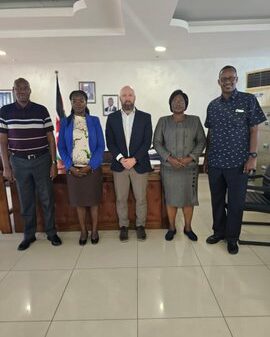NAIROBI, Kenya, Mar 9 – As we celebrate the 98th International Women’s Day, today’s reality continues to be marked by global challenges that have implications on the entire world’s population.
The economic crisis, climate change, unemployment, poverty, and energy security are giving rise to deep anxiety and concern all over the world. In these times, empowering women is a question more valid than ever.
Gender equality and women’s empowerment are human rights that lie at the heart of development and the achievement of the Millennium Development Goals. Despite the progress that has been made, less than 16 per cent of the world’s parliamentarians are women, two thirds of all children denied schooling are girls and, both in times of armed conflict and behind closed doors at home, women are still systematically subjected to violence. 70 per cent of the world’s poorest people, living on less than one dollar a day, are women. Women either solely or largely support an increasing number of families. Projects aimed at improving the living conditions of the poor cannot, therefore, be effective unless women participate in their formulation and implementation, as contributors as well as beneficiaries.
The poorest women in developing countries are amongst those most affected by climate change due to its impact on agriculture, food security and water management which are traditionally women’s tasks. Diseases associated with dirty water kill between five and 12 million people a year, mostly women and children.
Experience shows that when women do get to play an important role in decision-making, the whole society tends to benefit from the results. Women bring in different experiences and ideas, and most importantly, have insight into the concerns of other women.
The United Nations Human Settlements Programme, UN-HABITAT, puts forward best practices of women empowerment. For instance in Malawi, provision of water to peri-urban communities was made more effective through the inclusion of women in water tap committees with the help of training programmes. Women knew which factors to take into account when planning the location, design and use of the water points.
In the Set-Setal settlement in Dakar, Senegal, women in the community embarked on a waste management programme, thus contributing to a decrease in infectious diseases such as typhoid and malaria, as well as to a reduction of the unemployment rate.
Another example of successful empowerment of women can be found in Liberia, where rape for a long time remained the most common crime. In 2007, the Government of India sent over 100 women police officers to Liberia – the first all-female police contingent ever deployed by the United Nations anywhere. This presence has encouraged women in Liberia to engage with the police – to report assaults, but also to join the Liberian police service.
UNIFEM, the women’s fund at the United Nations, illustrate how in Kosovo, the creation of a gender unit in the Kosovo Police Force helped bring human trafficking and forced prostitution out into the open and made them priority areas for the police.
These types of success stories need to be highlighted. We have reached a point in time, when women and their experience and contributions can no longer be overlooked. Including women in management in all fields is time and again proving to be a success, whether in small communities, bigger organisations, banks, enterprises, parliaments, governments or at the highest level of decision-making.
By including more women in the decision-making process, we can ensure that women’s experience, knowledge, interests and talents are fully recognised and taken into account. While women make up half of the population they are still poorly represented in the decision-making process. Empowering women is a matter of democracy.
Women should make their voices heard and act locally, at the national, regional and global level to change the content of policies. Because together, we can make a difference. To the benefit of women and society as a whole.
(This article was authored by the Delegation of the European Commission to Kenya)


































